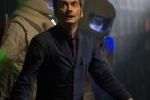Silence in the Library
Oh dear! It’s Steven Moffat’s worst story ever! Luckily, as it’s Moffat, it’s still damn good. Just not so awesome that I can drop off a one word review and move on. So; ‘Silence in the Library’ fails to satisfy lazy reviewers. But otherwise…
Well, for a start, it’s a Doctor Who story set inside a library, but it’s not about books. I mean, yes, there’s a bunch of them in it, but their main impact is… well, is unexpected, and not strongly related to their function as reading material.1 As is typical for a Steven Moffat script, it’s actually about quite a few things. Depressingly, it’s refreshing for a Who script to be overflowing with ideas; the scripts this year, ‘Fires of Pompeii’ aside, have been entertaining but uniformly workmanlike, with no more than one fascinating idea per forty-five minutes. The two parts of ‘Library’ average ten times that.
Let’s start with the monsters; because you can’t have the Doctor without the monsters. The Vashta Nerada have the coolest name of any creature in Who for some time, and are also the cheapest you ever did see. Or rather, didn’t see. Luckily, shadows are pretty emotive things, and making them viciously lethal works, generally.2 They get somewhat forgotten in the second part, sadly, and ultimately I felt like they had more potential than they got to display. I mean, we could have had some freaking huge shadows. I’m just saying.
In the second part, the shadows take a back seat to Donna’s own personal Matrix. It’s a particularly effective little story, giving Catherine Tait some interesting emotions to play with, and providing a much more interesting way to explain the plot than having the Doctor draw a circle and point to the middle of it. Though obviously he did that too, for some reason. The real fun here though, was watching characters on television respond to the usual abbreviated narrative conventions of television with surprise. It took me about a week to stop being vaguely amused at all the characters on every other show not noticing their peculiar way of skipping incidental moments in their lives.
And sprinkled all over these elements is the peculiar mystery of Professor River Song, future friend to the Doctor3 and all round good time archaeologist. Despite being played well by Alex Kingston, she isn’t quite as cool as the shadows. For a start, the audience is perhaps just as perturbed as the Doctor that they’re meeting someone out of sequence, and the script’s so busy making the Doctor suspicious and wary of the stranger with the bulky screwdriver that the viewers aren’t likely to really take to her. Hopefully, if she turns up again, we’ll get to actually be introduced to her.
I like Moffat. His plots are solid and his ideas are bountiful. His peculiar aversion to murdering his characters, however, becomes a bit strained here. Frankly, I like a spot of death. ‘Silence in the Library’ has a nice, poignant ending, and then another one, which on first passing feels a bit grotesque.4 Miss Evangelista has a lonely, tragic plot, which is then trivially undone. The hilarious Dr Moon is killed by Cal’s tantrum, but comes back later5 because everything’s so gosh darned happy now. Death just won’t stick in the library.
These minor quibbles aren’t enough to spoil it for me, though. There’s wonderful moments running through the whole story, from the tragedy of Miss Evangelista’s death, to the metatextual humour of Cal grinning at the Doctor’s heroics and hiding her face in fear, to the first time the Doctor’s name is spoken on screen. It’s a joyful ride, and I can’t help but think that Doctor Who‘s future is in safe hands.
As long as Steven starts killing people.
- It’s vaguely disappointing to have the Doctor enter a library planet and for the best book he mentions be Monty Python’s Big Red Book. I like to think of his tastes as vaguely eclectic, but, well, his little list at the start is somewhat overly poppy for a man who might have read every book ever written. ↩
- It looks like the production team didn’t quite have the time to keep track of every shadow though. There are those in this world who will automatically start checking whether the characters in a story cross shadows when they’re specifically told not to. These people will find what they’re looking for. ↩
- Or, she tortured him to death with his own screwdriver until he revealed his name. Let’s not rule it out. ↩
- Well, in a way. River’s essentially dead, but gets to live out her afterlife in the same constructed world we were just rooting for Donna to escape from. However, on reflection, she does have access to every book ever written. This is my idea of a good heaven, but what we actually see of it makes her appear like a single mum with three kids for eternity. This is not my idea of a good heaven. As I mentioned before; books in this story appear to be limited to peculiar little objects that get made from trees and then thrown at you. Even Cal, the girl placed inside the library because she loved books so, is continually parked in front of the telly. It’s all a bit disjointed. ↩
- Being a computer program, Dr Moon’s resurrection is of course more understandable, but I list it simply to illustrate the pattern. ↩


